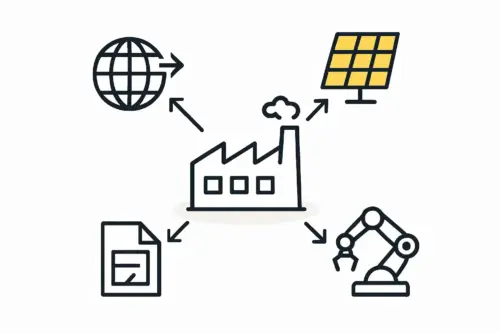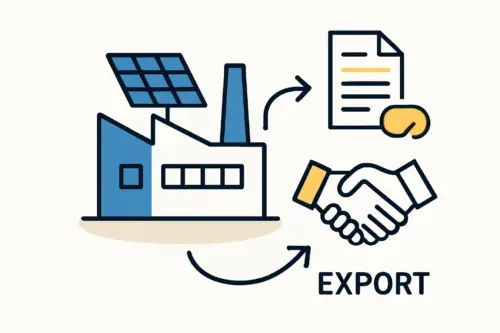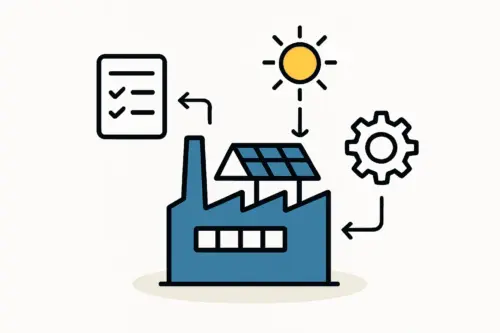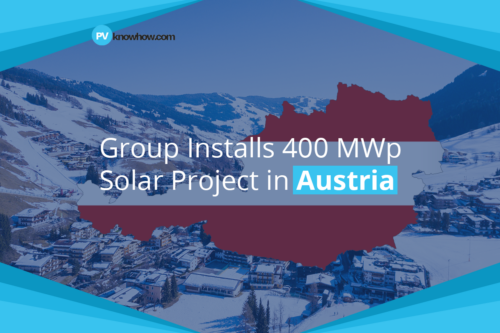Navigating Austria’s Solar Supply Chain: A Guide to Sourcing and Logistics
Austria’s commitment to renewable energy offers significant opportunities for the solar industry. As the nation pursues ambitious green targets, optimizing your solar component supply chain is key to success. For businesses looking to establish or expand their solar operations in Austria, mastering logistics, sourcing, and regulatory frameworks is essential.
Table of Contents
Seize the power of the sun!
Learn the ropes with our free e-course or get personalized assistance through our expert services. We’re dedicated to making your solar experience perfectly seamless and successful.
Austria’s Expanding Solar Market
Austria is experiencing robust growth in its solar sector. The country significantly increased its photovoltaic (PV) capacity in recent years, adding approximately 2.6 GW in 2023 to bring its total installed capacity to around 6.4 GW. Projections indicate this upward trajectory will continue, with targets aiming for nearly 10 GW by 2029.
This expansion is driven by national goals, such as achieving 100% renewable electricity by 2030, and supportive legislation like the Renewable Energy Expansion Act (EAG). This act streamlines processes and encourages PV development, creating strong demand for solar components and, consequently, an urgent need for efficient supply chains.
Sourcing Solar Components: Local and Global Options
For any solar venture in Austria, a critical step is deciding on a sourcing strategy for components and raw materials. Austria offers both local manufacturing capabilities and access to global markets.

Leveraging Austrian and European Manufacturing
Austria is home to notable solar component manufacturers. For instance, Energetica Photovoltaic Industries is a significant Austrian producer of PV modules with modern production facilities. Another major player, Fronius International GmbH, manufactures solar inverters and exports its products globally.
Sourcing locally or from within Europe offers several advantages:
potentially shorter lead times, high-quality standards, and alignment with initiatives like the “Made in Europe” bonus. The Austrian government offers incentives that make European sourcing more attractive. For example, PV and storage projects using European components may qualify for a bonus, which directly influences the cost-benefit analysis of your procurement strategy.
These benefits directly influence the cost-benefit analysis of your procurement strategy.
Key Distributors and International Imports
Austria has many established wholesalers and distributors of solar components who can simplify procurement and offer logistical support, providing access to a wide range of international brands. While European manufacturing is growing, importing components, particularly from Asia, remains a common practice due to cost or specific technological requirements.
The most effective strategy often involves a balanced approach. Weigh the benefits of local and European sourcing against global options by considering key factors like cost, quality, lead times, transportation logistics, and the impact of policies like the “Made in Europe” bonus.
Austria’s Logistics Infrastructure for Solar Components
An efficient logistics network is vital for the timely and cost-effective movement of solar components, which are often bulky, fragile, and require specialized handling.
Transport Networks
Austria’s well-developed transport infrastructure includes:
- Extensive road and rail networks, connecting domestic and international locations.
- Waterway transport via the Danube River, supporting heavy and oversized cargo.
- Major logistics hubs near Vienna, Linz, and Graz, facilitating storage and distribution.
When planning logistics, consider:
- The most suitable transport mode for your components.
- Challenges related to oversized cargo, such as route limitations and handling equipment.
Warehousing and Specialized Logistics Providers
Proper warehousing is essential for protecting solar components from damage and environmental factors. Several logistics companies in Austria offer services specialized for the renewable energy sector.
Leading providers include:
- DHL and DB Schenker, offering:
- Route planning and optimization.
- Management of oversized or delicate cargo.
- Supply chain visibility with tracking and analytics.
- New logistics centers, such as SKE’s facility for power storage and PV products, improving industry support capacity.
Addressing Logistical Challenges
Despite a robust infrastructure, challenges remain. Last-mile delivery to remote installation sites requires careful planning. Grid capacity for new solar installations can also create an indirect challenge, influencing demand patterns and putting pressure on the supply chain. Proactive planning and close collaboration with experienced logistics partners are key to mitigating these issues.
Import and Export Procedures in Austria
Navigating the customs and regulatory landscape is fundamental to managing a solar supply chain that involves importing or exporting goods.
Regulatory Framework
As a member of the European Union, Austria adheres to EU customs regulations. Key requirements include obtaining an Economic Operators Registration and Identification (EORI) number for businesses involved in customs activities. Components must also carry the CE marking, indicating conformity with health, safety, and environmental protection standards. The Waste Electrical and Electronic Equipment (WEEE) Directive imposes obligations regarding the collection, treatment, and recycling of electrical and electronic equipment, which includes many solar components.
Documentation and Compliance
Ensuring smooth customs clearance requires mStrong relationships with reliable suppliers and logistics providers are fundamental to a resilient solar supply chain. Conduct thorough due diligence when selecting partners in Austria, considering their experience in the solar industry, financial stability, quality certifications, and capacity to meet your specific needs. Industry associations and networks can also be valuable resources for identifying potential partners and gaining market insights.

Given the evolving nature of trade policies, staying informed about potential tariffs or duties on solar components is crucial. Customs brokers or trade specialists can provide invaluable assistance in this area.
Building Strategic Partnerships
Strong relationships with reliable suppliers and logistics providers are fundamental to a resilient solar supply chain. Conduct thorough due diligence when selecting partners in Austria, considering their experience in the solar industry, financial stability, quality certifications, and capacity to meet your specific needs. Industry associations and networks can also be valuable resources for identifying potential partners and gaining market insights.
Key Considerations for Your Austrian Solar Supply Chain Strategy
Optimizing your supply chain in Austria requires a strategic approach that balances various factors:
- Cost vs. Quality vs. Resilience
Evaluate trade-offs between lower-cost global sourcing and potentially higher-cost but more resilient European or local options. - Risk Mitigation
Diversify your supplier base to reduce dependency on single sources and account for geopolitical risks. - Leveraging Incentives
Actively explore and apply government incentives, such as the “Made in Europe” bonus, in your financial planning and sourcing decisions. - Sustainability
The environmental impact of your supply chain is increasingly important. Local sourcing can offer significant benefits in carbon footprint reduction. - Future-Proofing
Stay informed about market trends, technological advancements, and regulatory changes to keep your supply chain agile and competitive.
Careful consideration of these elements will help you develop a robust and efficient supply chain, positioning you for success in Austria’s growing solar market.







